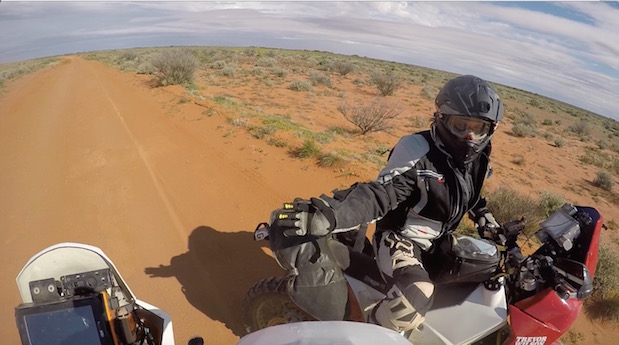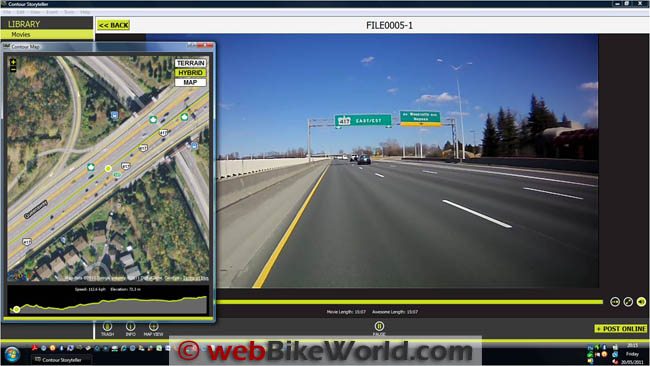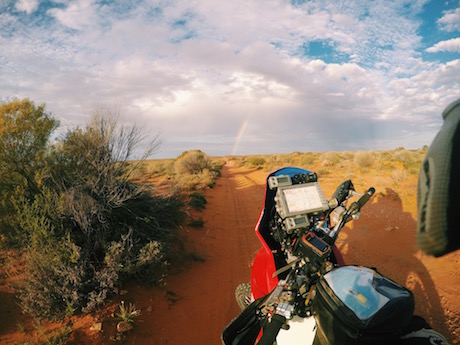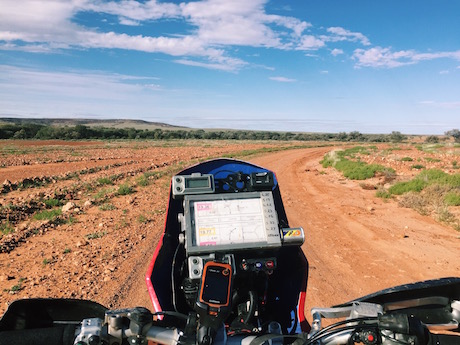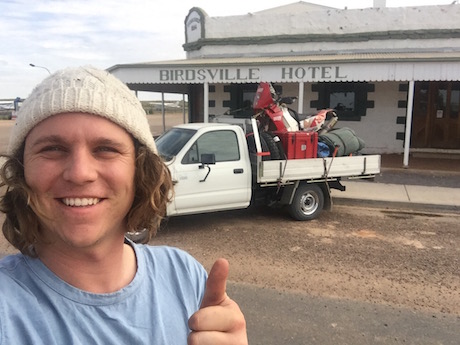Dakar Rally debutante Scott Britnell is still determined to race in the gruelling event in January 2017, despite suffering a massive crash at 100km/h while trying to set a record double crossing of the Simpson Desert in a single day.
In the end, the record now belongs to Brisbane teacher Trevor Wilson, 25, who tagged along with Scott at the 11th hour and is now also considering the Dakar Rally.
Scott, 41, was ready to set off on his KTM 690 Rallye in June, but was delayed a few weeks by appendicitis. He axed his plans for 10 crossings in a week – more than 5000km and 11,000 sand dunes – but was still attempting the double crossing record.
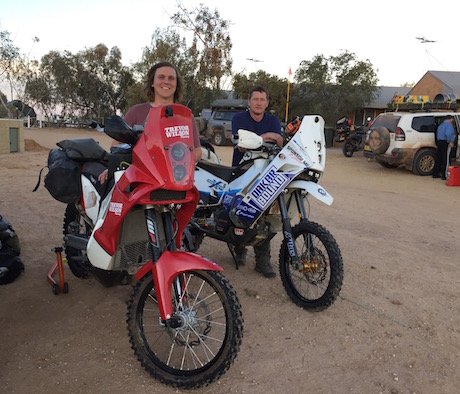
DAKAR MISSION
Scott is no stranger to tough riding having broken the east-west transcontinental crossing of Australia in 2014 in 72 hours, a 17th in the Abu Dhabi Desert Challenge and a sixth in Qatar’s tough Sealine Cross Country Rally which places him 4th in the FIM World Rankings, not far behind KTM’s Toby Price who was this year the first Australian to win the race.

An online fund has been set up to help Scott achieve his dreams. If you can help Scott, donations can be made here.
RECORD ATTEMPT
Scott says Trevor, a former enduro rider, met him at Quilpie and they were shaping up for a successful record attempt with the notoriously soft red sand of the Simpson Desert relatively hard from recent rain.
They set off from Birdsville at 4am on Sunday July 10 in perfect conditions and Scott reached the 520km turn-around point of Mt Dare to refuel in under eight hours.

“Having not stopped for anything more than bladder relief since Poeppels Corner, I shouted myself a bit of a rest and cold drink,” he says.
After his 40-minute break, he started riding back and after about half an hour he was relieved to see Trevor still heading west.
“We stopped for a few minutes for a chat. We were both in good spirits and happy to be riding our own pace,” Scott says.
“It was good to see that Trevor was comfortable with the concept of riding alone in this quite remote part of the country. It’s not for everyone, and Trevor seems to have a mature approach to the associated risks.
“I said good luck and shook Trevor’s hand and suggested that he just keep plugging away.”
Now, with a full load of fuel, Scott’s bike was making smooth work of the rough surface conditions between Mt Dare and the western edge of the Simpson Desert dunes.
THE CRASH
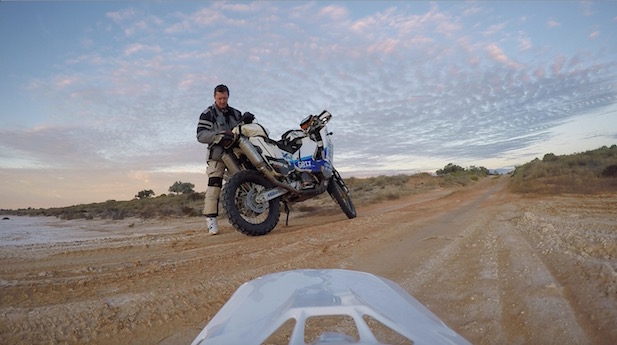
“Things took an unexpected turn when I rounded a bend at speed and was presented with a water-covered track. I was hard on the brakes when my back wheel hit a rather sharp lump that’s urged me into a forward somersault at better than 100km/h.
“It all happened so fast and had left me knocked out cold. Not sure how long I was out! Things are a bit hazy from that point.
“My next memory is of rolling around on the ground trying to escape the pain in my chest. I rolled into my hands and knees and struggled to get my helmet and backpack off.
“Somewhat bewildered, my instincts kicked in, I staggered the 45 metres over to my bike and grabbed my satellite phone before returning to my original spot.
Somehow I set the phone up and dialled my wife. I gave her a brief diagnosis of my injuries before the reception cut out and the line went cold. I knew she would have been watching my SPOT Tracker and would be able to coordinate a response.”
THE RESCUE
Still somewhat rattled, Scott’s next memory was a pair of 4WD vehicles pulling up by his bike.
“These guys kicked into action, started making calls on their sat phone and made me as comfortable as possible,” he says.
“It was good to now be in the hands of someone else as the pain was starting to really kick in. These guys were calm and measured in dealing with things. After several phone calls, we had word that the RFDS (Royal Flying Doctor Service) had been activated and were coordinating efforts to fly in and get me the assistance I needed.
“We knew there was no way around a bumpy ride in a vehicle to get to the nearest airfield, which was at Dalhousie Springs.”
The rescue party was hiding Scott’s bike behind some bushes when Trevor appeared on the scene.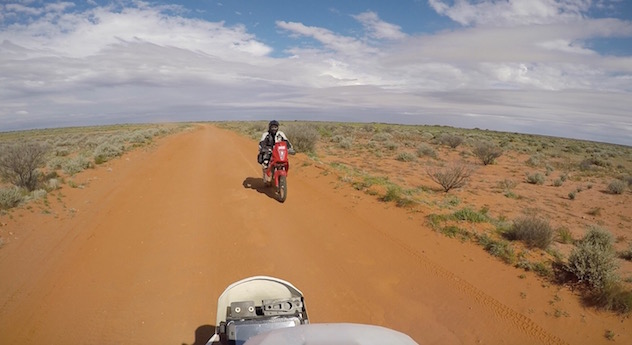
THE RECORD
Scott says Trevor seemed distressed, but he told him everything was under control and that he should continue.
“Daylight was running out fast and I knew he had a long way to go, so I suggested he grab my SPOT Tracker and get on his way,” he says.
So Scott and the rescue party headed west while Trevor continued east into the dunes and into the record books, arriving safely back in Birdsville after a 23 hour and 38 minute epic double crossing of the Simpson Desert.
Scott found out about Trevor’s record the next morning when he rang him in hospital.
“I was bitterly disappointed that I had let a minor lapse of concentration ruin my plans, but happy to have found a new riding partner who shares the same perspective on pushing the physical and mental boundaries doing what we love,” he says.
Trevor says he was using the double crossing as a “personal test to see whether I could handle the long days and mental strength required for the longer cross country rallies”.
He almost didn’t make it, running out of fuel 15km from Birdsville. “I used half a cup fuel that was left sloshing in the bottom of the fuel bladder to nurse into town,” he says.
Trevor is heading to Dubai in December for a month of navigation and dunes training to prepare for his first FIM World Championship Cross Country Rally in the Abu Dhabi Desert Challenge next April.
THE INJURIES
After a long and painful trip to an airfield and then on to Royal Adelaide Hospital, Scott was given the tally of his inures:
- 9 broken ribs;
- Punctured lung;
- Bruised liver; and
- Separated collar bone and torn ligament from the shoulder.
Scott recovering in hospital
After an operation to re-attach the ligament to his shoulder and relocate his collar bone, the rough rider is already talking about heading back into the desert for further preparation for the Dakar Rally.
He wished to pass on his thanks and respect to his rescuers, especially RFDS, and all the well-wishers.
“I live to ride in the name of adventure and I can’t wait to recover and head out on my next ride into the wilderness,” he says.
Many riders have been rescued by the RFDS. If you would like to donate, click here.



